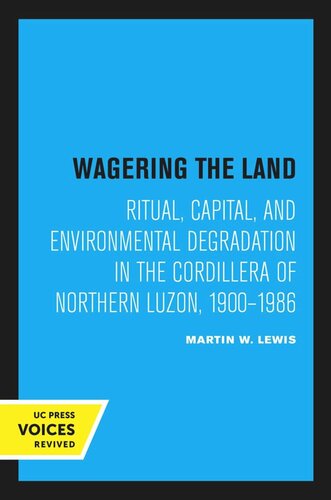

Most ebook files are in PDF format, so you can easily read them using various software such as Foxit Reader or directly on the Google Chrome browser.
Some ebook files are released by publishers in other formats such as .awz, .mobi, .epub, .fb2, etc. You may need to install specific software to read these formats on mobile/PC, such as Calibre.
Please read the tutorial at this link: https://ebookbell.com/faq
We offer FREE conversion to the popular formats you request; however, this may take some time. Therefore, right after payment, please email us, and we will try to provide the service as quickly as possible.
For some exceptional file formats or broken links (if any), please refrain from opening any disputes. Instead, email us first, and we will try to assist within a maximum of 6 hours.
EbookBell Team

4.1
30 reviewsWhy do market farmers in the rugged northern Philippine highlands stage ever more costly, elaborate ritual feasts so that their ancestors will shower success on ever more costly, ecologically risky farming ventures? Because the commercialization of agriculture in the area surrounding Buguias has resulted in a unique blend of new and old economic, environmental, and religious practices. Wagering the Land documents clearly the ecological degradation commonly associated with "modern" farming methods: deforestation, soil erosion, pesticide contamination, and wildlife extermination. But the breakdown of communal bonds and local beliefs also associated with modernization in most theories of rural development simply has not happened. On the contrary, traditional beliefs, and especially the redistributive prestige feasts that figure largely in the indigenous religion (called Paganism by both its adherents and its adversaries), have flourished. Development of truck gardening in the cool highlands of northern Luzon, an area perfectly suited to the cultivation of temperate vegetables, gained momentum after World War II. Martin Lewis describes engagingly the economic and social life of Buguias and the centrality of religion during the first four decades of this century, the complete destruction of prewar agriculture and animal husbandry in 1944, and the explosion of commercial farming thereafter. Unaccustomed prosperity reinforced the religious practice of lavish communal feasting, which not only honors the dead and bolsters the status of the living but also brings "good luck" to the host farmer's enterprise if the ritual succeeds in placating the ancestors. Heavenly favor thus overshadows sound environmental practices, and the region's inhabitants are quite literally wagering their lands in the hope of gaining prosperity and prestige. Anthropologists and geographers, as well as environmental and development specialists interested in the Third World in general and Southeast Asia in particular, will find important new information and arguments in Lewis's well-researched ethnography.